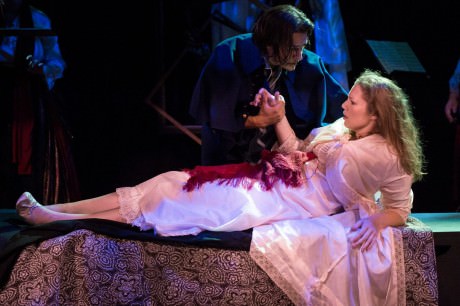A Gothic horror story that’s dense with symbolism, light on plot, and written in 1839 may not seem like ideal source material for a contemporary musical. But then again, few people saw Carrie or Night of Living Dead as ripe for the old song-and-dance treatment, and yet there they are (not to mention these). The truth is that the subject of a musical is never as important as the story that is told and the characters that are brought to life. However, it is still a challenge for any composer to translate Edgar Allen Poe into song. But this is precisely what Pallas Theatre Collective has endeavored to do with its new musical, The Fall of the House of Usher.

An original Pallas musical, with music by Sarah Hirsch, book and lyrics by Molly Fox, and directed by Tracey Elaine Chessum, Usher tells the story of the increasingly self destructive Roderick Usher (Jason Hentrich) and his twin sister, Madeline (Kristina Riegle), the last descendants of a prodigious aristocratic line. Fearful that images of he and sister won’t join the gallery of family portraits that line the family manse, Roderick enlists his old artist friend James (Mikey Cafarelli) to come to the Usher estate and paint their portraits before it is too late. Just what exactly is wrong with the Ushers is not clear: is it a mysterious and inevitable family curse? A bizarre mental illness that early 19th century medicine can only pretend to diagnose? An imagined calamity brought about by the Ushers’ own unshakeable sense of doom? Either way, there is something rotten in the house of Usher, and James is the poor soul who must bear witness.
The music in Usher, composed by Sarah Hirsch, is stunning in its complexity and imagination. Extremely Sondheim-esque, the music, which runs through most of the show, is sweeping and textured, and does justice to the Gothic tone of Poe’s original story. The lyrics, by Molly Fox, do a solid job of building the characters and progressing the story. Although the book (also by Molly Fox) veers sometimes towards the banal, it is usually adequate to carry the story along, at least until the next song begins. The other strong point in Usher is the marvelous set, designed by Tracey Elaine Chessum, which is both extremely simple and effective. Together with a dramatic lighting design by Jason Aufdem-Brinke, and a strong costume (and makeup) design by Jen Bevan, The Fall of the House of Usher is Gothically gorgeous to look at.
One of the central aspects of Poe’s original story is the notion that the house is “alive” with the spirits of the past, and this is translated quite literally in Pallas’ musical. The four “ghosts” of Ushers past (Laura Rocklyn, Hilary Morrow, Russell Silber, and Jon Jon Johnson) act as a sort of Greek chorus, omnisciently surveilling the family estate. They also occasionally act as human set pieces, holding up lanterns and such for the use of the living characters. In this way, the ghosts support both the design of the show, and the idea that the house of Usher is alive. Jon Jon Johnson pulls double duty as a violinist whose haunting strings greatly contribute to the sound of the show, and as the medieval ancestor Alabric Usher. Hilary Morrow, as Merowald Usher, is a consistently engaging and demonic presence that highlights how heavily the Usher ancestry weights on the current living members.

Both Mikey Cafarelli (James Cleary) and Jason Hentrich (Roderick Usher) give committed performances as the erstwhile friends, turned rivals for Madeline’s affection. However, both actors struggle to live up to Sarah Hirsch’s music, which, although it is a testament to Ms. Hirsch’s success in composition, detracts from the effectiveness of the show. Likewise, I questioned the believability of both characters at various points throughout the show, diminishing the Gothic spell that Ms. Hirsch and Ms. Chessum worked so earnestly to cast.
Given their recent production of The Yellow Wallpaper, and their current Fall of the House of Usher, Pallas Theatre Collective seems to draw great inspiration from evil houses. Yet it is unclear in both shows whether the houses themselves are the source of their inhabitants’ distress, or the inhabitants themselves. In either case, The Fall of the House of Usher is a unique and engaging new musical; Maybe Edgar Allen himself is tapping his toes in his tomb.
Running Time: Two hours, with one intermission.
The Fall of the House of Usher plays through August 24, 2014 at plays at Pallas Theatre Collective performing at the Anacostia Arts Center – 1231 Good Hope Road SE, in Washington, DC. For tickets, purchase them at the door, or online.





